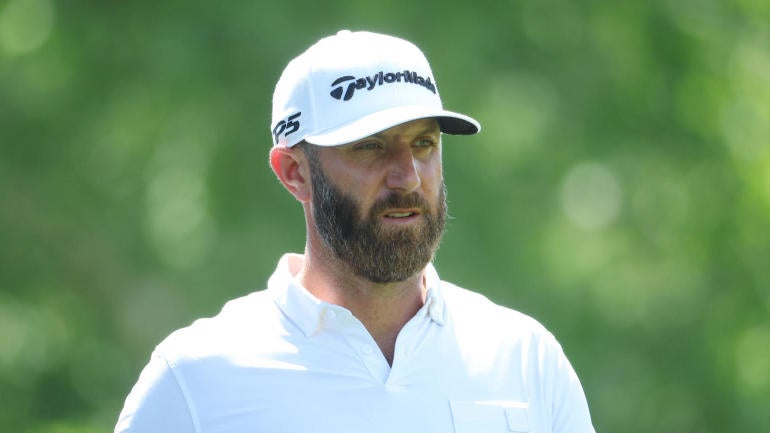
After several weeks of Fyre Festival-like assurances that big news was coming regarding its inaugural event -- but with absolutely nothing to show for it -- the first LIV Golf Invitational Series field has finally dropped. It has some surprises -- notably, Dustin Johnson as the headliner -- but much of the rest was expected.
Despite its relative innocuousness, there are plenty of takeaways from the announcement as 48 golfers tee it up in the first event of what is expected to be a long-term rival for the PGA Tour. Not all of these takeaways are obvious; some are implied or theorized. In many ways, this has been the substance of this league all along -- theoretical, hypothetical -- as it continues to dangle the carrot of being the preeminent destination for top golfers several years from now.
LIV Golf has billed itself as the league of the future; however, whether that future ever materializes is what will shape what happens to the PGA Tour and everything else in pro golf. One thing is for certain: It would be foolish (although extraordinarily tempting) to bury LIV Golf based on its first field.
The Saudi Arabians running this league don't care about what happens in 2022 or 2023. They might not even care about what happens in 2028 or 2029. They do care about normalizing their country and its political endeavors on the basis of sport. What looks like failure to us may be the beginning of a long-range normalization process to them. It's one of many angles to take as we evaluate this first field at the Centurion Club in London next weekend.
1. Surprisingly, D.J. makes sense
If you would have told me two weeks ago that the person who would serve as the face of the LIV Golf league has lost a number of heartbreaking major championships in absurd fashion, won the Masters and may or may not have ever been suspended by the PGA Tour, I think you know whom I would have guessed. However, Phil Mickelson is not in this field (not yet anyway). Dustin Johnson is in the field, though, and while that was a bit of a stunner based on his pledge of allegiance to Jay Monahan and Co. three months ago, it also makes a ton of sense.
D.J. has accomplished almost everything you can accomplish on the PGA Tour. If the major championships are not going to follow the PGA Tour's lead and attempt to ban players (more on that below), then taking this leap is a straightforward decision for him. Even a statement from his agent was easy to decipher: It's about the money. Furthermore, while some guys might attempt to justify where the money is coming from and why it's being distributed, D.J. doesn't operate like that. He just plays golf for as much money as possible and competes at majors.
At age 37, he's earned $74.3 million over the course of his PGA Tour career, but he has a chance to match or surpass that over the next few years with the massive $20 million purses LIV is offering. He may have already doubled it if reports of a guaranteed $125 million payday to move to LIV Golf are accurate. If D.J. can play this tour and still participate in the majors, it's easy to see why he would make the decision.
With a U.S. Open at Oakmont and a Masters already on his resume, I'm not sure if he really cares if he doesn't get to play in the majors anymore. D.J. is competitive, but he's not a psychotic competitor like some others. He's content with who he is and probably less concerned with what you think about his legacy than any top-tier athlete in the world.
2. LIV got the perfect front man
I don't know if they meant to do this, but LIV scored the perfect spokesperson. Most guys would feel the need to perform verbal yoga to explain why they took on the role as the top player in a rival league to the organization that originally paid them $74 million. D.J. will just shrug it off. Some would feel the need to rationalize the geopolitical state of Saudi Arabia and why this money isn't as dirty as it seems. D.J hasn't even thought about it. For as much as the LIV folks have bungled this roll out, they fell ass backwards into the absolute perfect face of their new rival tour.
3. Major response
The PGA Tour's response is predictable, and it likely won't come until after the first event has been played. It will reiterate severe disciplinary action on all players who choose to follow through with their commitment to play in this rival league. When you're outflanked so demonstrably regarding what (for some players) is the most important thing (money), you have to exercise discipline with as heavy a hand as possible. Whether the PGA Tour has the legal right to do this -- it's very complicated -- remains to be seen. Then again, will D.J. and others even try to come back and play on the PGA Tour? As long as they can score OWGR points elsewhere, I'm not sure there's a point to it.
Far more interesting is what the response will be from the major championship organizations: the USGA, R&A, Augusta National and the PGA of America. The USGA is particularly intriguing as it hosts the next major with the U.S. Open in two weeks, and three of its last 11 U.S. Open champions are in the field in London. To date, it has taken a fairly soft stance, and any neutrality it verbalizes in the weeks ahead will probably draw other major organizations into the same camp, which is a massive problem for the PGA Tour. If the PGA Tour can't count on the majors to follow its lead with disciplinary action, more top players will exercise their relative freedom to play the LIV tournaments while showing up for the major championships.
4. OWGR leverage
The PGA Tour does have one other card it can play, and it's a big one. As one of the founding members of the OWGR, it could convince the major championship organizations (also founding members of the OWGR) to not allow the LIV Golf events to distribute OWGR points. It's unclear where the events stand regarding distribution of points right now, but that would certainly disincentivize players who care about playing in majors to jump to the LIV Golf league.
However, some of the top players could feasibly talk themselves into the fact that they could potentially earn enough OWGR points from the four majors, as well as some Asian Tour events -- the Asian Tour is partially funded by LIV and certainly wouldn't ban players from playing -- to stay in the top 50 or 100 in the OWGR and qualify for the majors. The future of the PGA Tour seems to hinge on how the major championship governing bodies handle the LIV Golf league going forward.
5. What if LIV isn't going for pros?
We need to talk about this tweet. Even if the numbers are only half true, that's life-changing money for a 20-year-old. LIV Golf might be content picking off amateurs from the United States, Europe and Asia over the next five years and building a new house instead of renovating the one that already exists.
Just got a call from a person in the know that said one of the Ams got 6 million up front and 250k a start. THATS the biggest issue for Tour if they start picking off the top Ams. Mark it down, pga tour U top 5 will be full Tour card very soon
— Monday Q Info (@acaseofthegolf1) June 1, 2022
This begs the question of whether you can become a star outside of the context we already understand (see below), but it's a plan that's probably going to work for the following reason:
Rory McIlroy was asked about money in professional golf on Wednesday at the Memorial, and his answer was fascinating. He said making cash, not qualifying for majors, was top of mind as he entered the pro ranks. It's not as if McIlroy was toiling away in the Sunbelt Conference for four years in school. He was a can't-miss prospect who never missed, but he still wasn't thinking bigger picture. Sometimes, because we focus on the tiny percentage of pro golfers for whom winning a major championship is a reality, we miss out on the other 97% (including young, future stars) for whom it's not.
"When I turned pro, I was playing for money. I wanted to keep my card," said McIlroy. "I remember I played the Spanish Open in 2007 as an amateur, and the year before, one of my really good friends in amateur golf, Oliver Fisher, had turned pro and got his European Tour card. And we went out for dinner one night in Madrid, and before going out for dinner, I looked at The European Tour Order of Merit and saw he made 200 grand that year. And I was like, 'Oh my God, 200 grand, that's unbelievable. The guy is loaded.'
"I think at the start, of course, we turn professional to earn a living playing golf. Like when I turned pro, I was nowhere near getting in majors. I was nowhere near playing at the top level of professional golf. I hoped to be there one day, but like all I wanted to do was get my Tour card, make a living playing golf. ... There's a lot of different parts to this. Do I play golf for money now? No. My situation has changed over the years. But when I started playing the game professionally, yeah, money was at the top of the list."
If this was true for Rory, then it's true for almost everyone, which means that LIV is probably going to be able to hand-select a lot more top amateurs than top pros. That will be beneficial. Rick Gehman brought up a good point on our podcast on Wednesday, too. If you've never been a PGA Tour member and you join LIV Golf first, couldn't you join the PGA Tour later on since you never broke the rules they had in place because you were never part of their organization?
6. But ... does context matter?
If you didn't know any of the golfers you were watching, or what tournament they were playing or their scores, it would be extraordinarily difficult to determine who was the best just from seeing them on television. My point is that even if LIV Golf can pick off the top amateurs -- the ones with the best strokes gained and best scoring averages -- I'm not sure they will become the stars they would have been on the PGA Tour because we have no historical context for the Centurion Club or Pumpkin Ridge or this league whatsoever.
Jon Rahm and Jordan Spieth and Justin Thomas are who they are because it's easy to contextualize what they're doing. We understand what the PGA Tour is and what the majors are and how they're performing compared to historical precedent. All that is to say, I'm not sure it even matters if LIV gets the top stars because I'm not sure they can become top stars outside of the PGA Tour and the majors.
7. Where's Phil?
I would have bet a lot of money (not a Lefty-sized amount of money, but still a lot) that Mickelson would be in this field. Perhaps he still will be. There are six spots open for other players, and Mickelson might fill one of them next week. He's in a unique position in that he is qualified for the next four years at the U.S. Open, until he's 60 for the PGA Championship and Open Championship, and he has a lifetime invite to the Masters. Playing major championships is not in jeopardy for him, which means that unless he believes the majors will ban LIV golfers, the risk for him is fairly low (presuming he doesn't care about his status or legacy on the PGA Tour). Depending what the response from the major organizations is over the next few weeks, I suspect the LIV Golf fields in Portland, New Jersey and Boston over the rest of the summer will be considerably stronger -- and will likely include Mickelson.
8. What's next?
Who knows?! Based on this field, LIV Golf could be tantamount to a modern European Tour. With the old European Tour (now named the DP World Tour) coalescing with the PGA Tour, it makes sense that a lot of players who formerly played quite often on the Euro Tour will now play LIV Golf instead. Indeed, this is the bones of the league and could become more so in the future. That has so many implications, including for the majors, the PGA Tour, and of course, the Ryder Cup. We will likely get response from all of those organizations in the days ahead.
The event itself is going to be bizarre. The gap in talent between Johnson, Talor Gooch and Kevin Na to Jediah Morgan and Hideto Tanihara is comical. The breadth of scoring at the first event will likely reflect that. The 12-team draft -- if it is broadcast -- will be hilarious, especially if D.J. is featured. The entire thing seems like it's going to be a bit of a circus.
This moment in time for golf is not a joke, however. There is real staying power for LIV Golf and legitimate fear around what's going to happen to the PGA Tour.
The PGA Tour doesn't have the coffers to weather this storm if it is fundamentally a financial war, which it might be. The Tour will need to catch a few breaks and retain its top talent by any means possible, including enlisting the major championship organizations to wield their power. The LIV Golf group has been exhausting in its battle just to get to this starting line next week, but make no mistake that this is a starting point.
LIV Golf is in it for good and will endure through the wealth of its backers. What happens over the next few years is anyone's guess, but one thing we do know is that whatever it is, it will shape the future of professional golf forever.

















